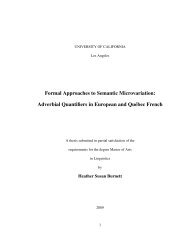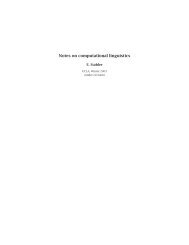- Page 1 and 2: UNIVERSITY OF CALIFORNIA Los Angele
- Page 3 and 4: The dissertation of Kie Ross Zuraw
- Page 5 and 6: 2.7.3. Generating a novel form.....
- Page 7 and 8: (36) Distribution of consonants in
- Page 9 and 10: (122) Syncope .....................
- Page 11 and 12: This dissertation draws mainly on d
- Page 13 and 14: VITA March 29, 1973 Born, Montreal,
- Page 15 and 16: ABSTRACT OF THE DISSERTATION Patter
- Page 17 and 18: xvi
- Page 19 and 20: (introduced by Halle 1959 as “mor
- Page 21: (1) Under- and overspecification /k
- Page 25 and 26: 1.2.1. Regularities in a separate s
- Page 27 and 28: The ranking tendencies of these sub
- Page 29 and 30: are still in use. During the time o
- Page 31 and 32: (5) Examples of Tagalog affixes bar
- Page 33 and 34: the surface representation. The ran
- Page 35 and 36: 2. The model as applied to nasal su
- Page 37 and 38: nonsubstitution, using a variety of
- Page 39 and 40: =EEI@=( would be failure of alignme
- Page 41 and 42: The constructions illustrated in (9
- Page 43 and 44: 100% 50% 0% 100% 50% 0% =- (adversa
- Page 45 and 46: To determine the statistical signif
- Page 47 and 48: constructions, and that within ever
- Page 49 and 50: We can perform a χ 2 test for the
- Page 51 and 52: (17) Semantic unpredictability with
- Page 53 and 54: 2.3.1. Introduction 2.3. An experim
- Page 55 and 56: KC=(J (no substitution, no assimila
- Page 57 and 58: (22) Rates of substitution on novel
- Page 59 and 60: lexical-frequency data against whic
- Page 61 and 62: highly significant—p < 0.0001 by
- Page 63 and 64: substituted word and unsubstituted
- Page 65 and 66: (27) Constraints against coalescenc
- Page 67 and 68: of outputs for each input that is a
- Page 69 and 70: There are two ways of implementing
- Page 71 and 72: suggested in Pater 1999b. I suspect
- Page 73 and 74:
Hayes and Stivers propose that the
- Page 75 and 76:
(36) Distribution of consonants in
- Page 77 and 78:
or learned) would disfavor substitu
- Page 79 and 80:
(39) Constraints affecting nasal su
- Page 81 and 82:
dorsals do not. The ranking of NASS
- Page 83 and 84:
or front-initial stem: PU and MORPH
- Page 85 and 86:
2.5.1. Substitution diacritics Rath
- Page 87 and 88:
But in any case, as discussed in §
- Page 89 and 90:
2.6. The Learner Section 2.4.7 prop
- Page 91 and 92:
(46) Mini-lexicon for learning init
- Page 93 and 94:
Using an initial learning increment
- Page 95 and 96:
2.7. The Speaker Section 2.6 presen
- Page 97 and 98:
Probabilities of Ci>>Cj for integer
- Page 99 and 100:
P(/=/+/RCV/+/puntol/ → [mampupunt
- Page 101 and 102:
The high ranking values of USELISTE
- Page 103 and 104:
Because the output is held constant
- Page 105 and 106:
Since the denominators are the same
- Page 107 and 108:
where Listedness(whole word) is the
- Page 109 and 110:
adjective) 71 word is almost comple
- Page 111 and 112:
For example, if Listedness(/mamumun
- Page 113 and 114:
The difference between (66) and (67
- Page 115 and 116:
(68) Probability of listener’s gu
- Page 117 and 118:
[mampupuntol] actually decreases (0
- Page 119 and 120:
anked constraints that are relevant
- Page 121 and 122:
@E(E> ‘sew fishing nets’ (not f
- Page 123 and 124:
To see how this applies to our case
- Page 125 and 126:
(77) P(Ci >> Cj) = P(Mi - Mj > -0.5
- Page 127 and 128:
constraints. Since each of the thre
- Page 129 and 130:
& USELISTED>>ENTRYLIN & PU>>ENTRYLI
- Page 131 and 132:
3. Simulating the adoption of a new
- Page 133 and 134:
Spanish loanwords as an indication
- Page 135 and 136:
3.3. Model of the speech community
- Page 137 and 138:
The usual result of competition bet
- Page 139 and 140:
mampupuntol/ or /mamumuntol/ was th
- Page 141 and 142:
3.5. Simulation results The simulat
- Page 143 and 144:
Clearly, b-initial stems are not be
- Page 145 and 146:
3.7. Appendix: Functions used in th
- Page 147 and 148:
epresented in lexical entries. Sect
- Page 149 and 150:
The second systematic source of non
- Page 151 and 152:
A(JA ‘cord’ A(J ‘leprosy’ (
- Page 153 and 154:
The operation of the constraints is
- Page 155 and 156:
The analysis is not complete, howev
- Page 157 and 158:
Tagalog has a large vocabulary of w
- Page 159 and 160:
(101) Over- and underapplication in
- Page 161 and 162:
‘loathing’; =@=(@ ‘unfolded
- Page 163 and 164:
4.4.1. Analysis I call the constrai
- Page 165 and 166:
correspondent in representation B b
- Page 167 and 168:
syllables to be identical. Suzuki
- Page 169 and 170:
4.5. Distribution of exceptions in
- Page 171 and 172:
There are several possible explanat
- Page 173 and 174:
(111) Effect of proximity 100% 90%
- Page 175 and 176:
internal correspondence relation th
- Page 177 and 178:
First, note that the reduplicative
- Page 179 and 180:
4.6. Similarity along other dimensi
- Page 181 and 182:
(117) Effect of onset voicing on ra
- Page 183 and 184:
(120) Effect of vowel length on rai
- Page 185 and 186:
4.7. Representations Chapter 2 assu
- Page 187 and 188:
(122) Syncope syncope alone (many e
- Page 189 and 190:
speakers must be able to reason abo
- Page 191 and 192:
construction of lexical entries for
- Page 193 and 194:
(127) Vowel height in a novel word:
- Page 195 and 196:
which a word with less similar mid-
- Page 197 and 198:
glottal deletion 141 (/=C/+/RED2syl
- Page 199 and 200:
4.10. Chapter summary This chapter
- Page 201 and 202:
To test the significance of the dif
- Page 203 and 204:
words (in the production grammar, t
- Page 205 and 206:
associative network (see, e.g., Rum
- Page 207 and 208:
Perhaps today new loanwords’ beha
- Page 209 and 210:
should be of the form Xt in the pas
- Page 211 and 212:
to swamp the effect of the others;
- Page 213 and 214:
When a listener hears a past tense
- Page 215 and 216:
6. Summary The preceding chapters h
- Page 217 and 218:
References The American Heritage La
- Page 219 and 220:
Dempwolff, Otto (1969). Vergleichen
- Page 221 and 222:
Pater, Joseph (1996). “Austronesi
- Page 223:
phonological neighbourhood effects.

















